
BOLLETTINO DELLA SOCIETA PALEONTOLOGICA ITALIANA
metrics 2024
Illuminating Earth's Biological History
Introduction
BOLLETTINO DELLA SOCIETA PALEONTOLOGICA ITALIANA is a prestigious journal dedicated to the field of paleontology, published by the SOCIETA PALEONTOLOGICA ITALIANA. Established in 1979, this journal has played a pivotal role in disseminating significant research findings and scholarly articles that enhance our understanding of Earth's biological history. With a proud history of publication stretching from 1979 to 2024, the journal maintains a strong reputation, currently holding a Q2 ranking in Paleontology, reflecting its influence and caliber within the scientific community. Additionally, it is ranked #49 out of 113 in the Earth and Planetary Sciences category by Scopus, placing it in the 57th percentile of its field. While not an open-access journal, it provides critical insights and findings valuable to researchers, professionals, and students alike, fostering a deeper appreciation for paleontological studies. Located in Modena, Italy, the journal continues to be a key resource for advancing knowledge in paleontology, making it an essential read for anyone committed to this fascinating scientific discipline.
Metrics 2024
 0.40
0.40 1.30
1.30 1.40
1.40 34
34Metrics History
Rank 2024
Scopus
IF (Web Of Science)
JCI (Web Of Science)
Quartile History
Similar Journals
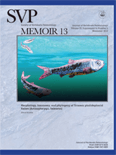
JOURNAL OF VERTEBRATE PALEONTOLOGY
Exploring the Depths of Earth's Ancient FaunaJOURNAL OF VERTEBRATE PALEONTOLOGY, published by Taylor & Francis Inc, is a premier academic journal dedicated to advancing the field of vertebrate paleontology. With a strong emphasis on both traditional and innovative research methods, this journal provides a platform for the dissemination of influential studies and discoveries that shape our understanding of vertebrate evolution and their ecological contexts. Operating under an ISSN of 0272-4634 and an E-ISSN of 1937-2809, it covers research published since 1981 and aims to foster a collaborative environment for researchers, professionals, and students alike. The journal is currently ranked in the Q2 category of Paleontology, standing at position #45 among 113 in its Scopus category, which underscores its significant contribution to the academic community. As a crucial resource for scholars, JOURNAL OF VERTEBRATE PALEONTOLOGY provides insights that not only enrich academic discourse but also stimulate further research and exploration in a field that bridges biology, geology, and conservation.
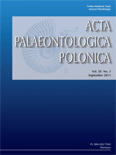
ACTA PALAEONTOLOGICA POLONICA
Illuminating the Path of Life Through TimeACTA PALAEONTOLOGICA POLONICA is a leading scholarly journal in the field of paleontology, published by the Institute of Paleobiology, Polish Academy of Sciences. With its open access model established since 1956, the journal ensures that vital research related to Earth's history and the evolution of life is freely accessible to a global audience. Based in Warsaw, Poland, this journal has garnered a respectable impact within the academic community, currently positioned in the Q2 quartile of its field and ranking #47 out of 113 in Scopus for Earth and Planetary Sciences, reflecting its significance in advancing paleontological research. Covering a wide range of topics related to fossil studies and evolutionary biology, ACTA PALAEONTOLOGICA POLONICA serves as a crucial platform for researchers, professionals, and students alike, encouraging the dissemination of innovative ideas and discussions that contribute to our understanding of past life on Earth. As it continues to publish high-quality articles through to 2024 and beyond, this journal remains integral to the ongoing discourse in paleontological sciences.

Swiss Journal of Palaeontology
Exploring Evolution Through Fossil InsightsSwiss Journal of Palaeontology, published by SPRINGER INT PUBL AG, stands as a leading platform for innovative research within the field of paleontology, contributing significantly to the understanding of Earth's historical life forms and their evolutionary pathways. With its ISSN 1664-2376 and E-ISSN 1664-2384, this journal has established a strong presence in academic circles, recognized as a Q1 journal in the category of Paleontology for 2023. Moreover, it ranks 20th out of 113 in the Earth and Planetary Sciences, securing an impressive 82nd percentile on Scopus, underscoring its influence and reach in the scientific community. The journal publishes cutting-edge research findings, theoretical advancements, and comprehensive reviews that span the globe, making it an essential resource for researchers, professionals, and students in the paleontological sciences. For those interested in contributing to and learning from the latest discoveries, the Swiss Journal of Palaeontology promises to be an invaluable addition to your academic library.

Arthropod Systematics & Phylogeny
Illuminating the path of arthropod evolution and diversity.Arthropod Systematics & Phylogeny is a pivotal journal published by the SENCKENBERG NATURHISTORISCHE SAMMLUNGEN DRESDEN, MUSEUM TIERKUNDE in Germany, dedicated to advancing the understanding of arthropod systematics, phylogenetics, and evolutionary biology. With an ISSN of 1863-7221 and an E-ISSN of 1864-8312, this journal has established itself as a reputable source for high-quality research, evident by its ranking in the Q1 category for Insect Science and Q2 in Genetics. Covering a spectrum of subjects within the realms of agricultural and biological sciences, it caters to a diverse audience of researchers, professionals, and students eager to explore the intricate relationships and evolutionary histories of diverse arthropod taxa. The journal has been consistently publishing impactful studies since its inception in 2009, with ongoing contributions expected to bolster its presence in the academic community through 2024 and beyond. Although it currently does not offer open access options, its rich content serves as a valuable resource for those passionate about entomology and genetics, fostering collaboration and innovation in an important area of biological research.

PALEONTOLOGICAL JOURNAL
Illuminating the Story of Life on Earth.The PALEONTOLOGICAL JOURNAL, published by PLEIADES PUBLISHING INC, is a premier platform for the dissemination of research in the field of paleontology. With an ISSN of 0031-0301 and E-ISSN 1555-6174, this journal serves the academic community by providing insights into fossil studies, evolutionary biology, and the historical narrative of life on Earth. Despite being categorized in the Q3 quartile for 2023 and currently holding a Scopus rank of #84 out of 113 in the Earth and Planetary Sciences- Paleontology category, it remains a valuable resource for researchers and practitioners. The journal's coverage spans from 1990 to 2024, offering a comprehensive historical perspective while also addressing contemporary issues in paleological research. Scholars and students alike benefit from its rigorous peer-reviewed articles and the opportunity to access vital knowledge in the ever-evolving field of paleontology.
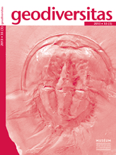
GEODIVERSITAS
Unveiling the Secrets of Earth’s PastGEODIVERSITAS, an esteemed journal published by the Museum National d'Histoire Naturelle, represents a significant contribution to the fields of geology and paleontology. With an ISSN of 1280-9659, this peer-reviewed publication has established itself as a vital resource for researchers, professionals, and students alike, disseminating high-quality and innovative research since its inception in 2002. Covering a broad spectrum of topics within earth sciences, GEODIVERSITAS not only showcases cutting-edge studies but also fosters a deeper understanding of geological and paleontological phenomena. Ranked in the Q2 category of both geology and paleontology for 2023, the journal exemplifies rigorous scholarly standards and makes significant strides in enhancing knowledge within these disciplines. With its headquarters in Paris and a commitment to scientific excellence, GEODIVERSITAS stands as a leading voice in contemporary earth science research, inviting contributions that drive forward the conversation in geology and paleontology.
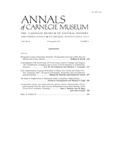
ANNALS OF CARNEGIE MUSEUM
Documenting Earth's Legacy: A Trusted Source for Natural History InsightsANNALS OF CARNEGIE MUSEUM, published by the Carnegie Museum of Natural History in the United States, stands as a significant forum for scholarly research in the fields of Ecology, Evolution, Behavior, Systematics, and Geology. With an established history from 1990 to 2024, this journal caters to the scientific community by fostering the dissemination of high-quality, peer-reviewed articles that enhance our understanding of Earth's biological and geological processes. Notably recognized in the 2023 category quartiles, the journal ranks in Q2 for both Ecology and Geology, showcasing its importance and relevance in these disciplines. Although it currently does not offer open access options, the journal's rigorous editorial standards and impactful research, evidenced by its Scopus rankings, make it an indispensable resource for researchers, professionals, and students aiming to contribute to the advancing knowledge of natural history. The ISSN 0097-4463 and E-ISSN 1943-6300 facilitate easy access to its comprehensive archives, ensuring that vital insights into the natural world are readily available for ongoing scholarly exploration.

Bulletin of the Peabody Museum of Natural History
Advancing the Frontiers of Natural HistoryThe Bulletin of the Peabody Museum of Natural History, published by the Peabody Museum of Natural History at Yale University, stands as a pivotal journal in the fields of Animal Science and Zoology, Ecology, Evolution, Behavior and Systematics, and Plant Science. With an impressive impact factor and categorization in the top quartiles of these disciplines, the journal is recognized for its rigorous peer-reviewed research that contributes significantly to our understanding of biodiversity and ecological dynamics. Covering studies from 2010 to 2024, this journal plays a vital role in disseminating essential findings for scholars, professionals, and students alike. While it currently does not offer open access, its research is crucial for advancing scientific knowledge and fostering collaboration across various biological sciences. With its esteemed reputation and comprehensive scope, the Bulletin of the Peabody Museum of Natural History continues to be an important resource for those engaged in the study of natural history.
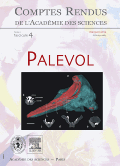
COMPTES RENDUS PALEVOL
Elevating Paleontology Through Quality Research and ReviewCOMPTES RENDUS PALEVOL, published by ACAD SCIENCES in France, stands as a pivotal journal in the field of paleontology. With an ISSN of 1631-0683 and an E-ISSN of 1777-571X, this esteemed publication provides a platform for innovative research and scholarly discourse, contributing significantly to the understanding of Earth's biological history. Having achieved a commendable Q2 rank in the 2023 Paleontology category and positioned at Rank #63 out of 113 in the Scopus Earth and Planetary Sciences segment, it underscores its relevance and influence in the scientific community. The journal's converged years from 2002 to 2024 reflect a commitment to ongoing research and knowledge dissemination. Although currently lacking open access options, the journal's rigorous peer-review process ensures the integrity and quality of published articles, making it an essential resource for researchers, professionals, and students striving to explore and expand their expertise in paleontological sciences.
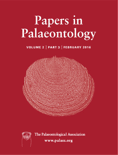
Papers in Palaeontology
Connecting the Dots of Earth's Ancient EcosystemsPapers in Palaeontology, published by WILEY, is a premier academic journal dedicated to advancing the field of paleontology. With an admirable impact factor and positioned within the Q1 category in Paleontology for 2023, this journal has established itself as a leading platform for innovative research and discussion, ranking 17th out of 113 in Scopus’s Earth and Planetary Sciences category. Since its inception in 2015, Papers in Palaeontology has aimed to publish high-quality, peer-reviewed articles that explore the diversity of ancient life forms and their evolutionary history. Researchers, professionals, and students alike will find valuable insights and rigorous analyses that contribute to the understanding of our planet’s past. Although Open Access options are not available, the journal provides a wealth of knowledge essential for anyone engaged in the study or practice of paleontology, solidifying its importance in shaping future academic discourse.